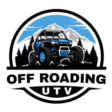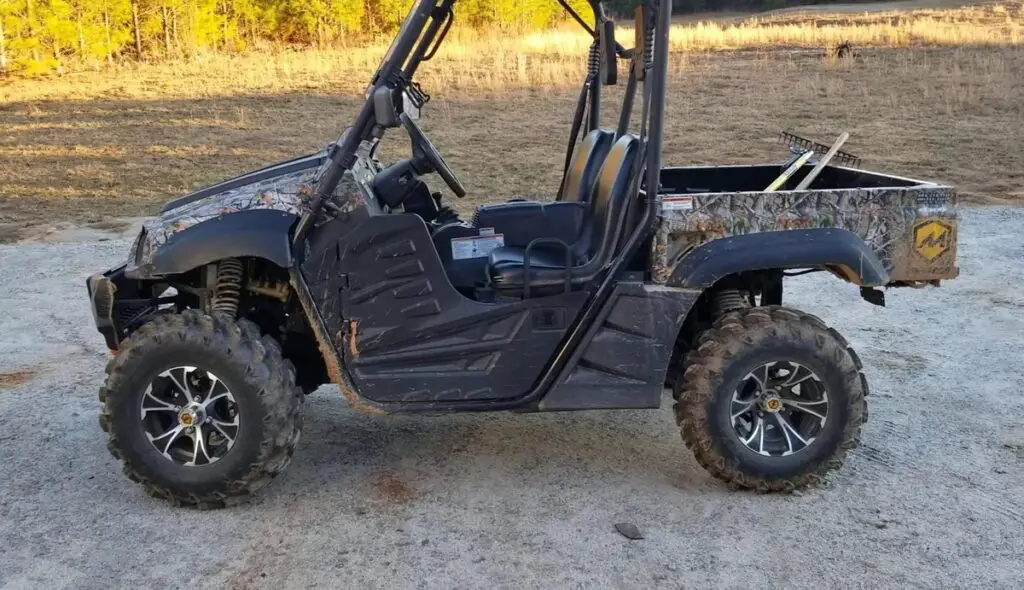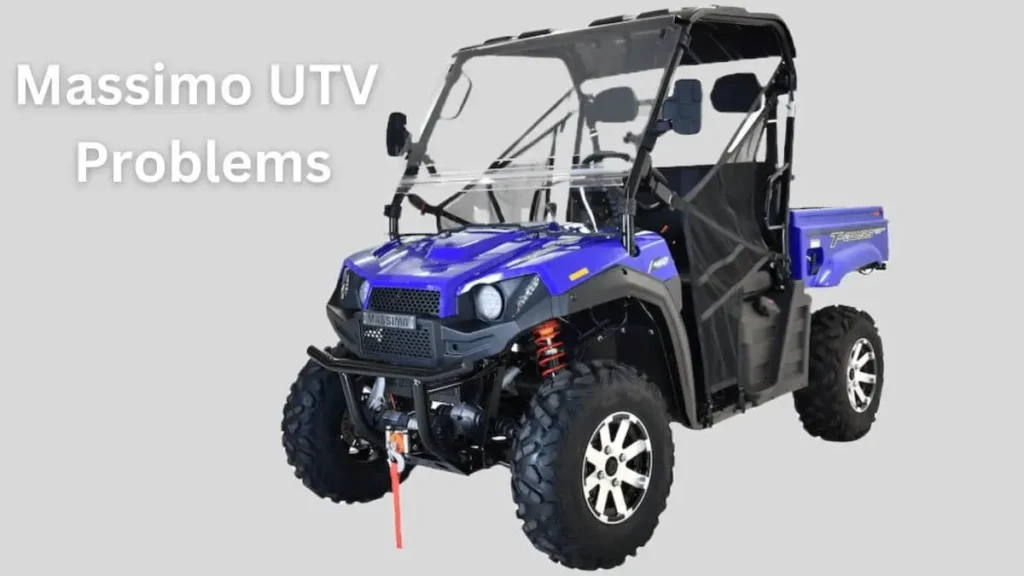The Massimo Buck 250 is great for agricultural, small business, and leisure applications due to its compact size and versatility.
The Massimo Buck 250 is poor for heavy-duty or dangerous off-road terrain, as its 12HP engine and lightweight cabin are best suited for moderate weight and easy as they are used.
The cost of the Massimo Buck 250 is only $5,999.
The Massimo Buck 250 UTV is an entry-level UTV designed for light utility tasks.
What is the Massimo Buck 250?
Massimo Buck 250 is a compact utility vehicle (UTV) made for dependable and reasonably priced. This UTV is ideal for daily utility work and comes in variants including the 2021 and 2022 Massimo Buck 250.
Massimo Buck 250’s 12 HP gasoline-injected engine provides outstanding performance while preserving fuel efficiency. Because of its great maneuverability and 772LB dry weight, it is a sensible option for confined locations and small roadways.
Is the Massimo 250 Good for Farming?
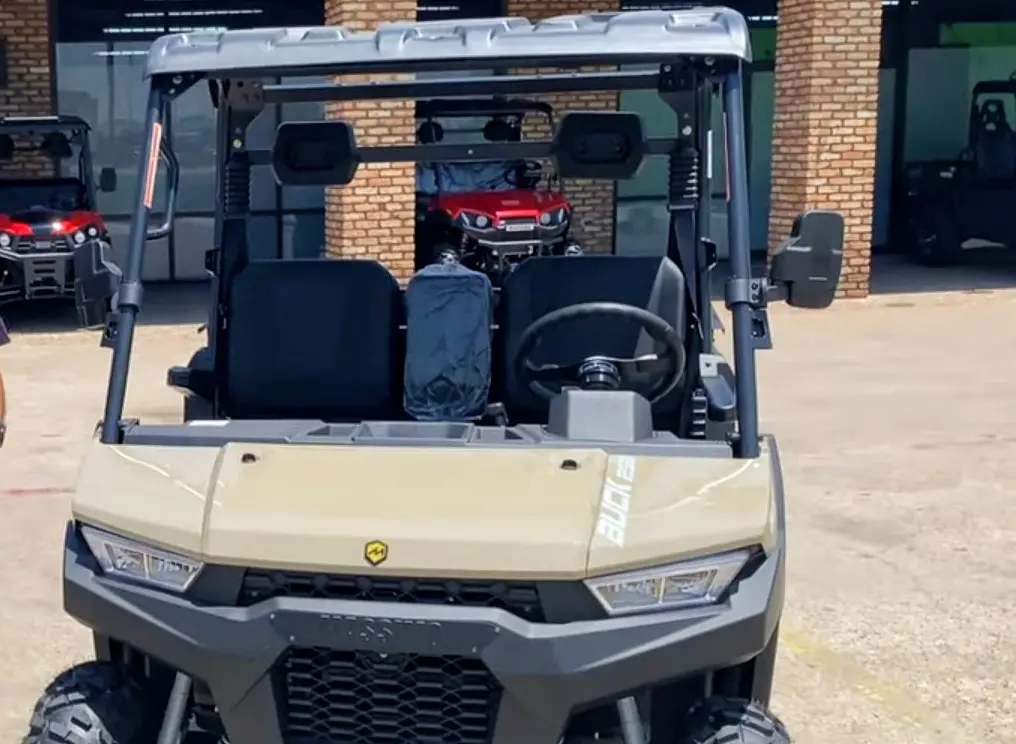
Yes, the Massimo Buck 250 is good for farming, particularly for small to medium-sized properties.
Massimo Buck 25p’s 6.5 cubic foot dumping cargo bed allows for easy transportation of tools, food, and light loads, while its compact size makes it easy to navigate narrow farm roads but not ideal for applications that are heavy, such as hauling heavy equipment or working on rough terrain.
Is the Massimo 250 Good for Small Businesses?
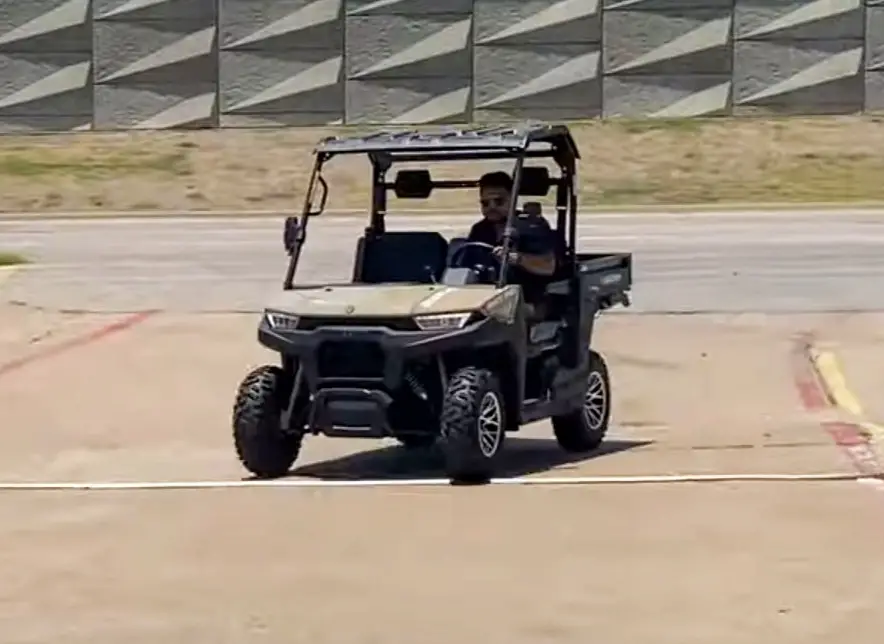
Yes, the Massimo Buck 250 is good for small businesses. It provides an affordable and efficient solution for small jobs such as freight, landscaping, or local deliveries.
The 12 HP fuel-injected engine provides enough power for normal applications, making it a useful choice for budget-driven projects.
Here is the table of key features of the Massimo Buck 250.
| Engine | 177cc, 12 HP |
| Transmission | Automatic F/N/R |
| Fuel System | EFI |
| Brake | Hydraulic disc |
| Ground clearance | 5.5 inch |
| Cargo bed capacity | 441 LBS |
| Dry weight | 772 LBS |
| Price | $5,999 |
Table of Common Problems and Solutions of Massimo Buck 250.
| Problem | Solution |
| Fuel injection problem | Clean injectors and always use quality fuel. |
| Battery drains fast | Avoid unnecessary usage and maintain the battery well. |
| Struggles on rough and tough terrains | Upgrade the suspension or try to drive on smooth terrain more. |
| Underpowered on heavy loads | Don’t overload the UTV, stay within the limit capacity. |
| Dumb bed latch stick problem | Lubricate the latch stick and clean regularly. |
Is Massimo Buck 250 any good?
The Massimo Buck 250 UTV is a reliable utility vehicle that performs ideal for light duties.
Powered by a 177cc EFI Air Cooled, 4-stroke, Single Cylinder engine, the Massimo Buck 250 UTV delivers 12HP, making it ideal for small farms, landscaping, and recreational use.
Massimo Buck 250’s compact design includes features like a 6.5 cubic foot dumping cargo bed, full lighting kit, and tilting windshield, ensuring functionality and convenience.
For those seeking a cost-effective consumer option, the Massimo 250, which retails for $5,999, provides outstanding value.
The Massimo Buck 250 UTV is a great option for consumers on a tight budget because of its sturdy design and useful features, which mix cost and efficiency.
Is Massimo Buck 250 affordable?
Yes, the Massimo Buck 250 is affordable. The Massimo Buck 250 price is $5,999, making it a budget-friendly option for light utility tasks.
Is Massimo 250 good for small businesses?
Yes, the Buck 250 Massimo is good for small businesses like farming and construction.
The 2021 Massimo Buck 250 and 2022 Massimo Buck 250 models offer a 6.5 cubic foot cargo capacity, suitable for light hauling in a construction business.
The Massimo Buck 250 handles a heavy workload, making the Massimo 250 ideal for versatile tasks.
Is the 2021 Massimo Buck 250 still available?
Yes, the 2021 Massimo Buck 250 is still available in selected dealerships.
This Massimo Buck 250 UTV features a 177cc EFI Air Cooled engine, a 6.5 cubic foot dumping cargo bed, and a durable build, making it perfect for light utility tasks.
The Massimo 250 is priced at $5,999, offering affordability and reliable performance.
Is the 2022 Massimo Buck 250 good to buy?
Yes, the 2022 Massimo Buck 250 is a good buy. This Massimo Buck 250 features a 177cc EFI engine, durable build, and compact size. The cost of Massimo 250 is $6,499.
Which is better? Massimo buck 250 UTV or ATV?
The Massimo Buck 250 UTV is better for tasks requiring cargo capacity and versatility, like farming. The ATV is more suited for recreation and tight terrain, offering better maneuverability.
What features make the Massimo Buck 250 stand out?
Features such as the 6.5 cubic foot dumping cargo bed add convenience for hauling materials, while the tilting full windshield, ABS half doors, and hard top roof provide comfort and protection in various weather conditions.
The Massimo Buck 250 stands out as an exceptional entry-level UTV due to its practical features and performance. It comes equipped with a 12HP fuel-injected engine, ideal for light-duty tasks.
With a standard full lighting kit, including headlights, taillights, front turn signals, and rear turn signals that provide excellent visibility for nighttime use. The 772LB dry weight ensures better maneuverability, making it perfect for navigating tight spaces.
Additional features include EFI, side mirrors, and a front bumper, making the Massimo Buck 250 versatile and efficient for multiple purposes.
How fast is Massimo Buck 250?
Massimo Buck 250 top speed is 30-35 MPH.
How many seats are there in Massimo Buck 250?
Massimo Buck 250 has a seating capacity of 3 people.
What kind of engine is in Massimo UTV?

The Massimo Buck 250 has a 177cc air-cooled engine, has one cylinder, and works in four strokes. It uses fuel injection and produces 12 horsepower.
Is the displacement capacity of Massimo Buck 250 good enough for heavy work?
The 177cc displacement capacity of the Massimo Buck 250 is appropriate for mild to moderate chores. Its displacement capacity isn’t the best for demanding tasks or large weights, though.
Is the Massimo Buck 250 engine liquid-cooled?
Yes, the Massimo Buck 250 features an air-cooled engine.
What are the transmission specs of the Massimo Buck 250?
The transmission system of the Massimo Buck 250 is automatic F/N/R with a chain final drive.
Is the drive system and fuel system of Massimo UTV good?
Yes, Massimo Buck 250 features a 2WD drive system and an EFI fuel system.
What is the size of the Massimo Buck 250 model?
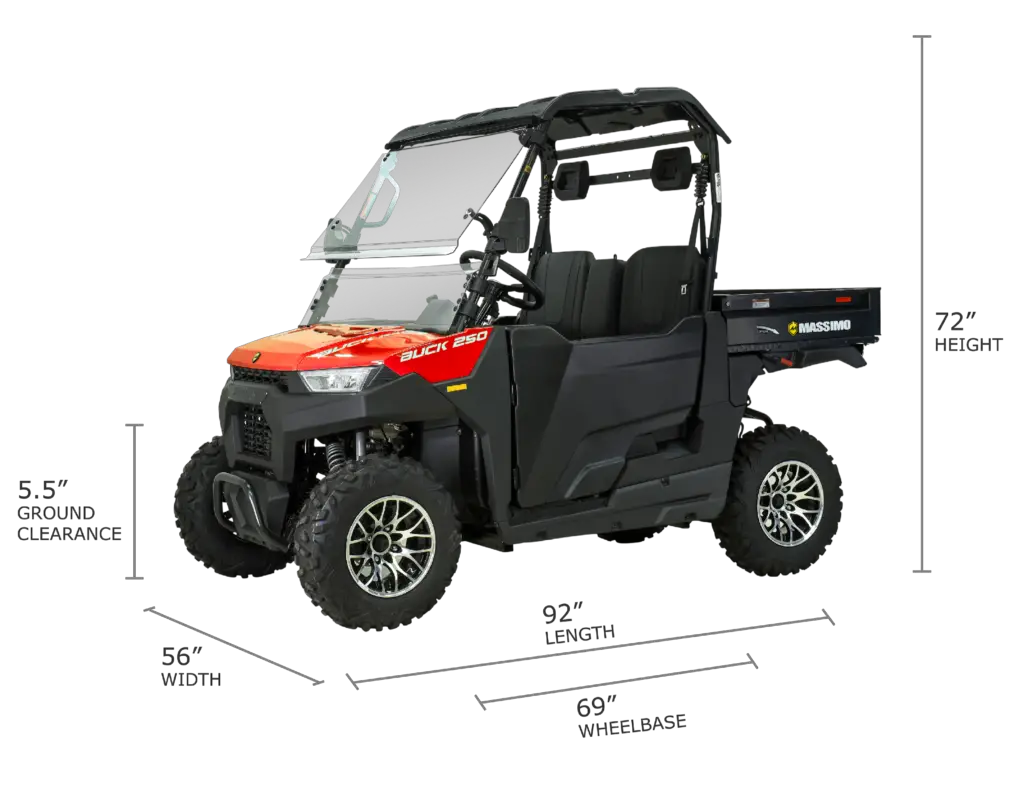
The Massimo Buck 250 is 72 inches in height, 56 inches in width, and 92 inches in length.
Is Massimo Buck 250 ground clearance and wheelbase sufficient to ride rocky terrains?
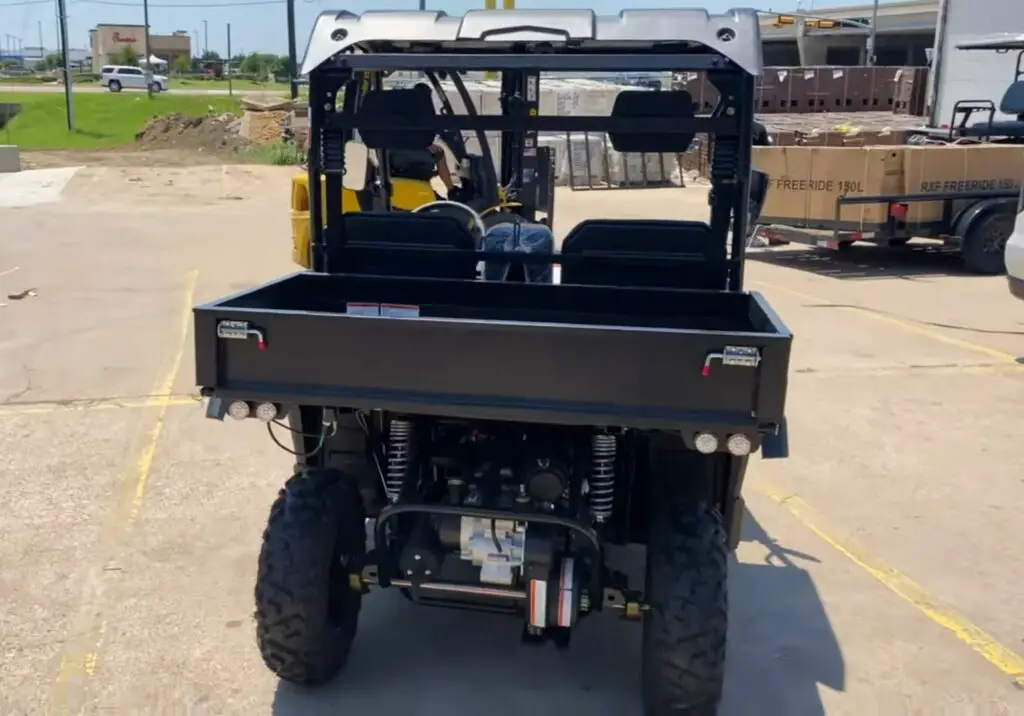
Massimo Buck 250 has a ground clearance of 5.5 inches and a wheelbase of 69 inches, which is sufficient for light off-road rocky terrains.
How heavy is Massimo Buck 250?
The dry weight of Massimo Buck 250 is 772 LBS which is not a heavy off-road vehicle.
Is my Massimo Buck 450 good for carrying loads?
Yes, the Massimo Buck 450 is good for carrying loads. Its 441 lbs cargo bed capacity with a hydraulic dump bed and dimensions of 22 in x 50 in x 6.5 in make it efficient for hauling.
Is Massimo Buck 250 dump bed hydraulic?
No, The Massimo Buck 250 does not have s hydraulic dump bed.
Are Massimo Buck 250 brakes good enough?
Yes, the hydraulic disc brake on the front and rear ends operates with one-piston calipers and drilled rotors of the Massimo Buck 250.
What is Massimo Buck 250 tire size?
The Massimo Buck 250 features 24×8-12 tires for both the front and rear, providing a balanced size for handling various terrains with stability and traction.
Massimo Buck 250 is good for which terrains?
The Massimo Buck 250 is ideal for smooth trails, dirt roads, light off-road paths, and flat fields. Its compact size and moderate clearance make it suitable for less rugged terrains.
What material is used in the Massimo Buck 250 windshield?
The Massimo Buck 250 features a tilting full windshield made of polycarbonate, offering durability and resistance to impact, ensuring clear visibility while providing protection from debris and elements.
What is the use of the top roof in Massimo Buck 250 UTV?
The hardtop roof on the Massimo Buck 250 UTV provides essential protection from the elements, such as sun, rain, and debris, offering comfort and shielding for passengers during outdoor use.
What kind of lights are used in Massimo Buck 450?
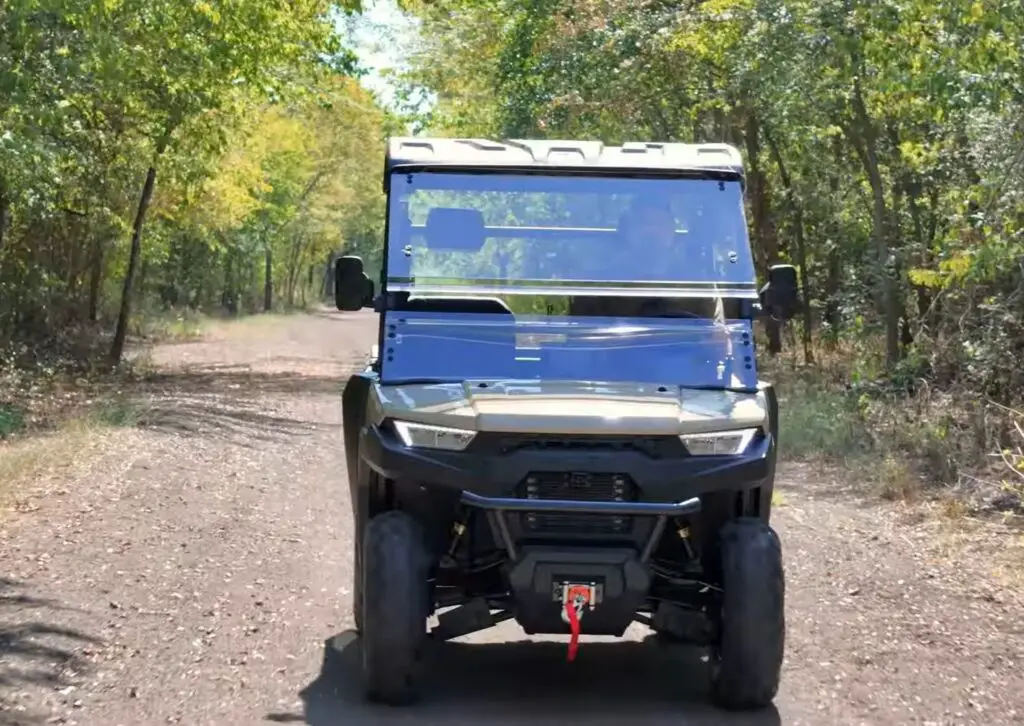
The Massimo Buck 450 uses headlights, taillights, front turn signals, and rear turn signals, similar to the Massimo Buck 250. These lights ensure visibility and safety, meeting standard lighting requirements for off-road use.
Can I use Massimo Buck 250 for multiple purposes?
Yes, the Massimo Buck 250 is versatile and can be used for many purposes, including agriculture, construction, camping, landscaping, road cycling, hiking, and hunting, thanks to its construction due to its durability, and portability.
What kind of glass is used in the Massimo Buck 250 mirrors?
Massimo Buck 250 has standard side mirrors featuring glass.
What features are on the digital display of the Massimo Buck 250?
The Massimo Buck 250’s digital display includes important features like the odometer, tachometer, speedometer, fuel gauge, and a variety of settings. It also contains an LED display that presents information cleanly and legibly.
What do people say about the Massimo Buck 250?
Customers generally praise the Massimo Buck 250 for its reliability, affordability, and versatility. They appreciate its smooth ride, ease of handling, and decent cargo capacity.
More ground clearance, according to some, would be advantageous on harder terrain. All things considered, it’s regarded as a great entry-level UTV for light-duty work, farming, and trail riding.
Does Massimo Buck 250 require frequent oil changes?
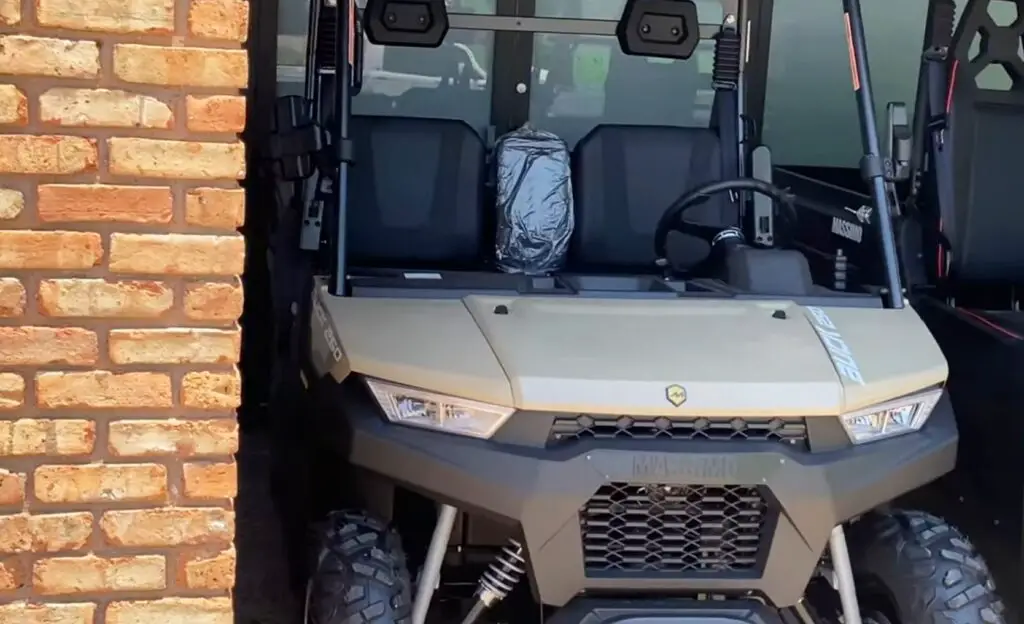
The Massimo Buck 250 requires regular oil changes, typically every 500-1,000 miles, depending on usage. It’s recommended to use Massimo 10W-40 full synthetic oil and replace the Massimo Buck 250 oil filter during each oil change to maintain optimal engine performance.
Is the Massimo Buck 250 manual really helpful?
Yes, the Massimo Buck 250 manual is very helpful for owners. It provides detailed instructions on daily inspections, vehicle operation, maintenance procedures, and troubleshooting common issues.
How to Change the Oil on a Massimo Buck 250?
To perform an oil change on the Massimo Buck 250, use the 10W-40 oil change kit. First, drain the old factory mineral oil and remove the old oil filter.
Next, replace it with an additional 10W-40 oil, being sure to use an oil additive to add the proper amount. Check for oil leaks and follow the manufacturer’s recommended oil change plan to ensure peak performance.
Are Massimo Buck 250 parts easily available?
Yes, Massimo buck 250 parts are easily available. Authorized dealers, internet retailers, and other vendors typically carry Massimo Buck 250 components.
Regular maintenance is simple for common replacement parts including air filters, brake parts, and oil filters.
What Massimo Buck 250 accessories increase productivity?
Yes, Massimo Buck 250 accessories increase the productivity. This includes the addition of 6.5 cubic feet of double-loading cargo boxes for load handling, a winch for tractioning, additional roof racks for further saving or holding, and LED lights and windscreens fitting to your car.
What is the difference between Massimo Buck 250 and Massimo Buck 250x?
The Massimo Buck 250X has a large cargo bed and better suspension, and it’s more suitable for heavy-duty work than the Massimo Buck 250.
Compared to the Massimo Buck 250, The Massimo Buck 250X has more benefits. The 250X is a complex gadget with cutting-edge capabilities and exceptional performance.
The Massimo Buck 250X has a bigger cargo bed, a higher drop, and a more robust suspension system than the normal Massimo Buck 250 model, making it better suited to rougher terrain and heavier workloads.
The 250X also features other comfort upgrades, such as full windshields, raised seats, and better power management, improving the ride quality during extended use.
These upgrades can provide the 250X has been incredibly valuable to users It provides a versatile and robust option for those who need more heavy-duty performance from their UTV.
How good is the Massimo Buck 250 golf cart?
The Massimo Buck 250 Golf Cart is a great option for both recreational and utility use.
The 2022 Massimo Buck 250X Golf Cart UTV offers a gas-powered engine with solid durability, perfect for navigating golf courses or outdoor environments.
Its 12HP EFI engine ensures smooth performance, while the customizable parts and features, such as upgraded suspension and cargo capacity, enhance versatility.
Whether you’re looking for a golf cart or a multi-use UTV, the Massimo Buck 250 delivers great value with reliable performance and durability.
Is the Massimo Buck 450 better than the Massimo Buck 250?
Yes, The Massimo Buck 450 is better than the Massimo Buck 250 due to its 450cc strong engine.
With a more potent engine 450cc in comparison to the Buck 250’s 250cc, the Massimo Buck 450 is higher desirable for stressful jobs and rugged environments.
While the Buck 250 is better perfect for mild farming, entertainment, and small organizations, the Buck 450 can convey a bigger payload. Here’s a quick comparison.
Features comparison table of Massimo Buck 250 and Massimo Buck 450.
| Feature | Massimo Buck 250 | Massimo Buck 450 |
| Engine | 177cc | 352cc |
| Horsepower | 12HP | 25HP |
| Cost | $5,999 | $8,999 |
| Use case | Light duty | Heavy duty |
What are the other UTV models similar to the Massimo Buck 250 UTV?
There are many other models similar to the Massimo Buck 250, such as the Massimo Buck 450, Massimo Buck 250x Golf, Massimo T-Boss 550, and many more.
- Massimo Buck 450X Golf
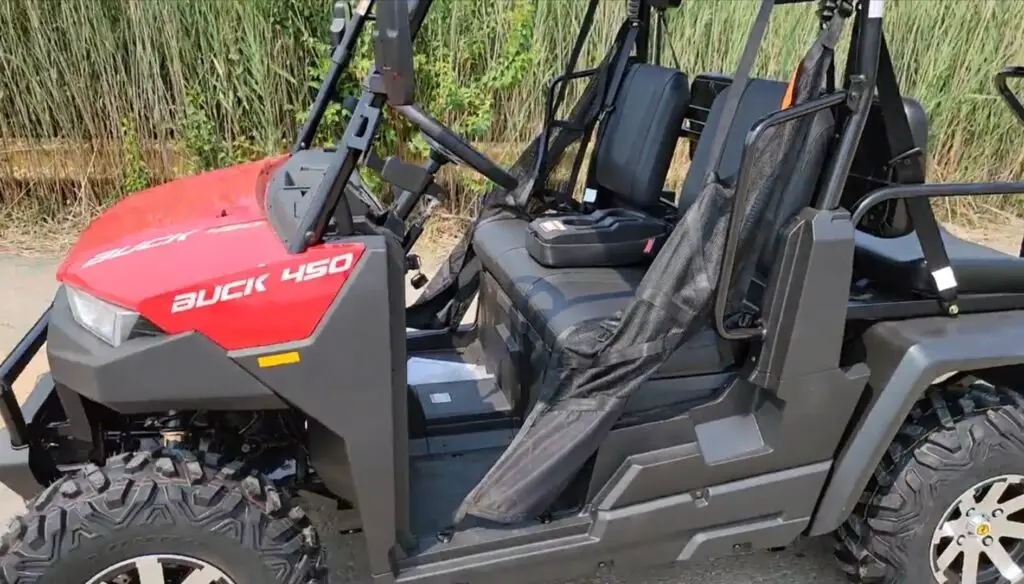
Massimo Buck 450X Golf has a 352cc, 25 HP, EFI, liquid cooling engine.
- Massimo Buck 450
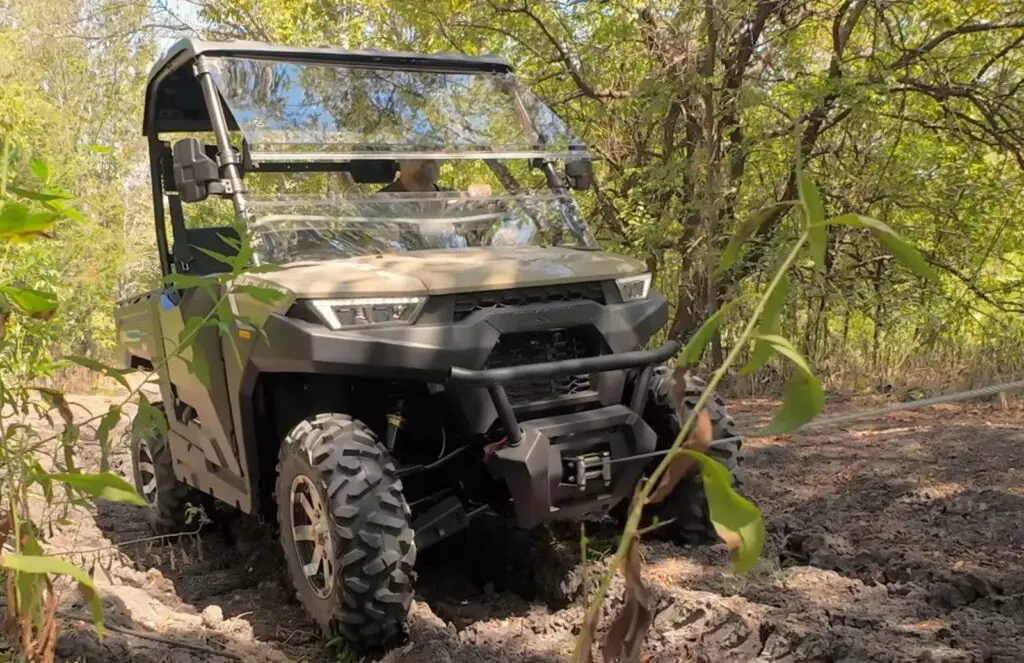
Massimo Buck 450 features a 352cc strong engine. Massimo Buck 450 can tow up to 1000 pounds.
- Massimo Buck 250x Golf UTV
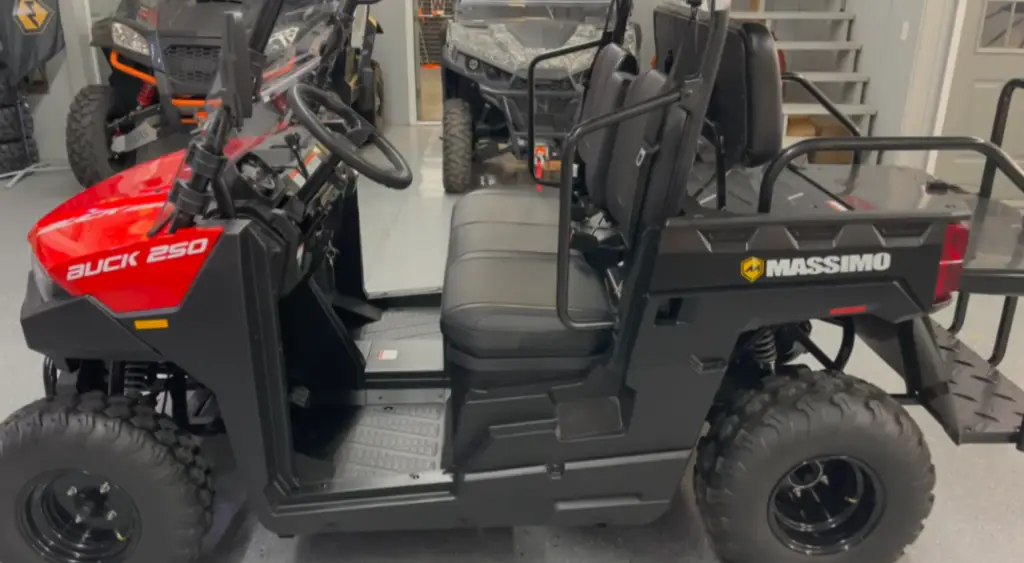
Massimo Buck 250X Golf UTV has a 177cc EFI Engine, 12HP, With an estimated price of about $5,000, it is well-suited for golf courses, recreation, and light-duty work with off-road capability.
- Massimo buck 250 Gas Golf Cart
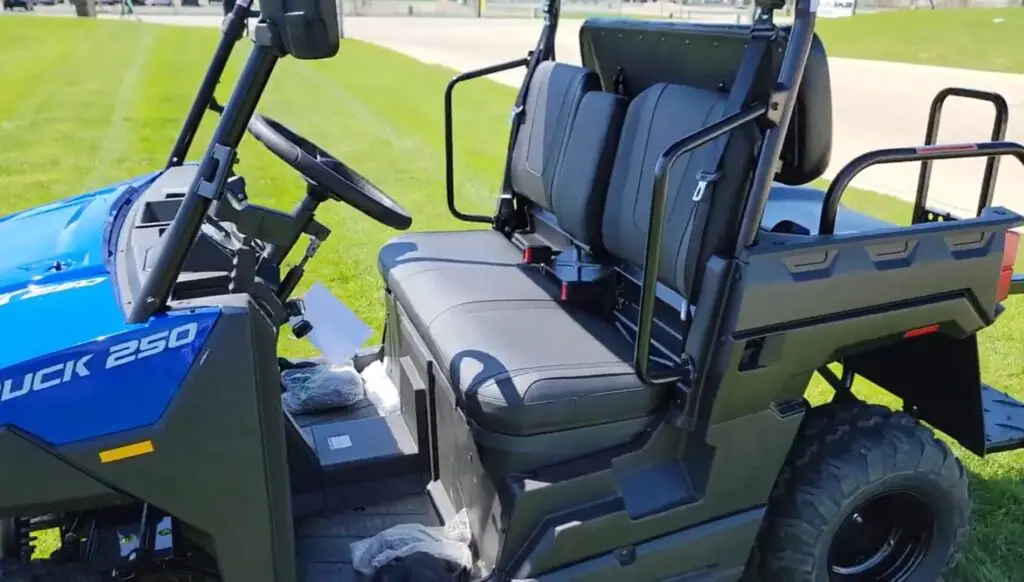
A 177cc engine producing 12 horsepower and a 6.5 cubic foot cargo bed powers the $5,000 Massimo Buck 250 gas golf cart.
The Massimo Buck 250 gas golf cart is ideal for light off-road adventure.
- TrailMaster Challenger 200X UTV
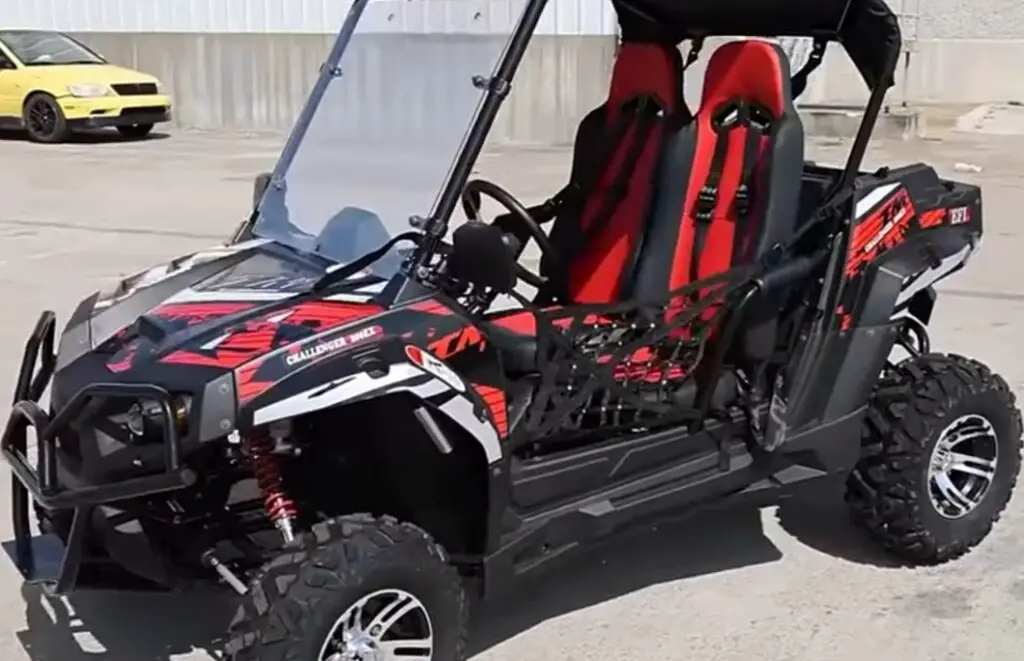
The TrailMaster Challenger 200X has an 11 horsepower, 168.9cc engine. This works well for relatively easy jobs as well as faster off-road experiences. You will be able to get your hands on the TrailMaster Challenger 200X for $3,699.
- TrailMaster Challenger 200EUX UTV
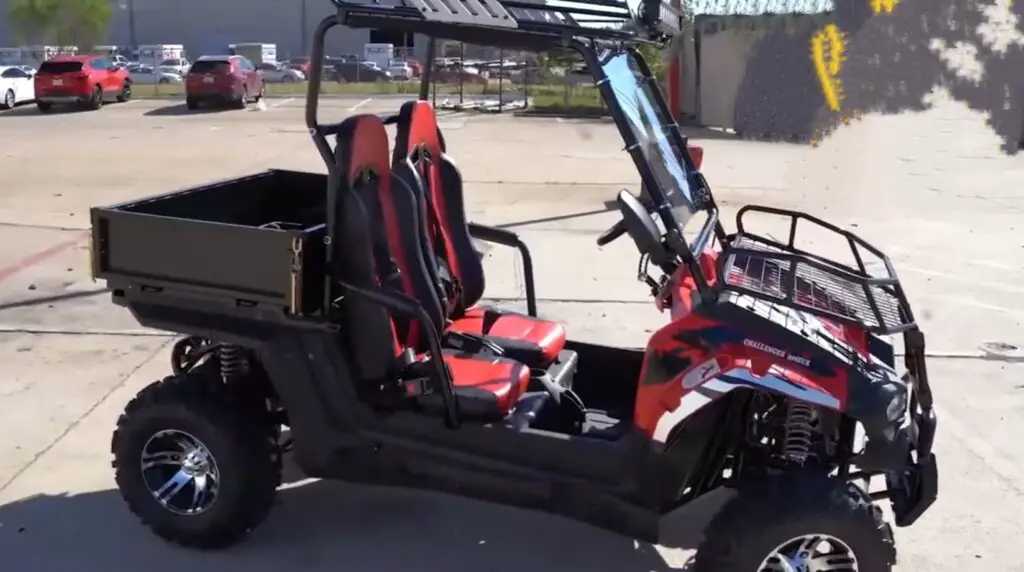
The TrailMaster Challenger 200EUX UTV has a 169cc, four-stroke, 12-horsepower engine with 4-wheel pressure. It is outstanding for light software paintings, off-road exploration, and leisure use, and it is priced at around $6,500. Perfect for beginners.
- TrailMaster BV
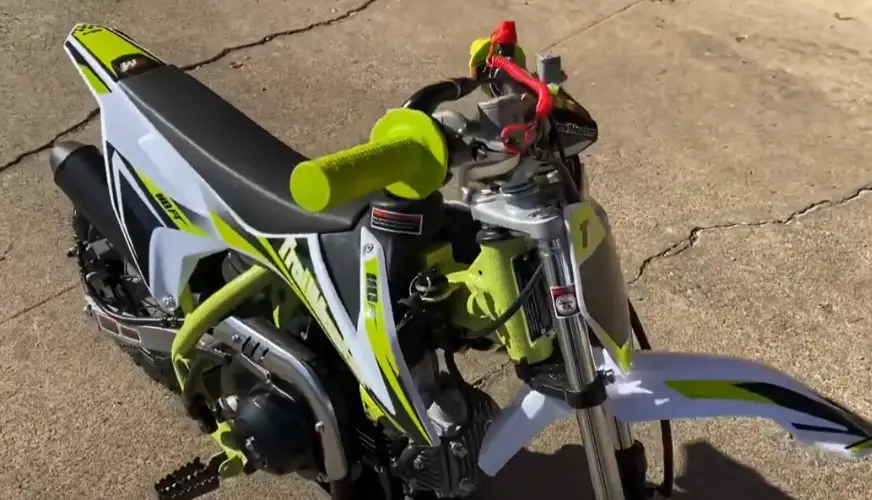
The Trailmaster BV 110cc dirt bike is perfect for trail riding and costs about $1,000.
- TrailMaster Taurus 200GX UTV
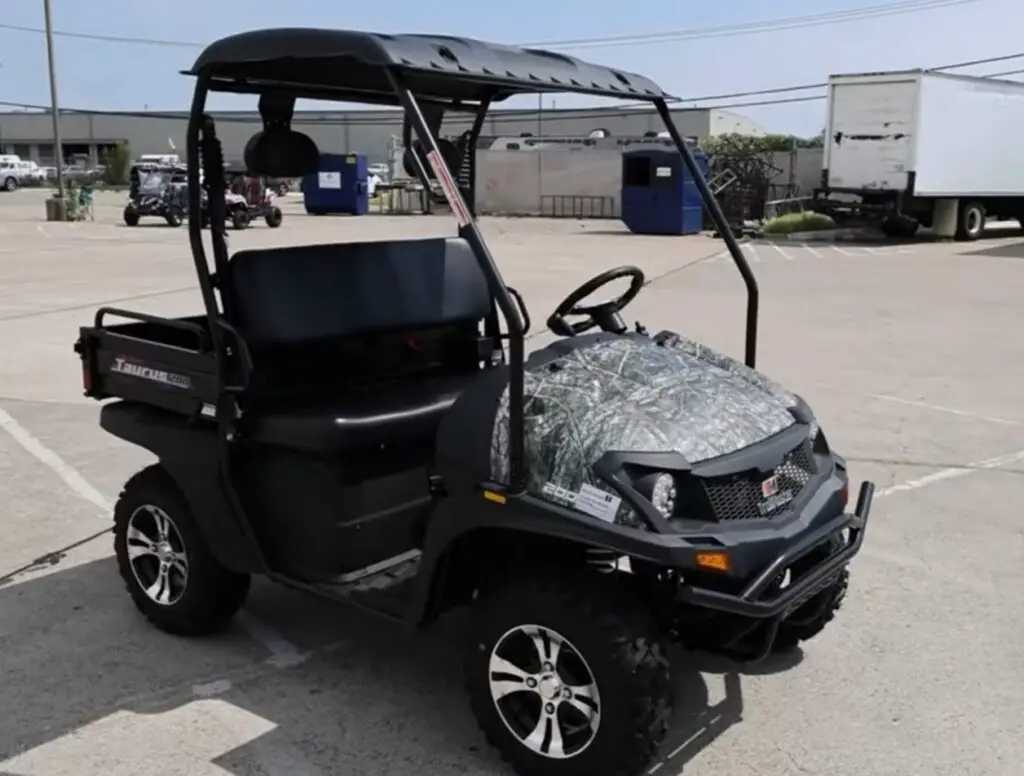
The TrailMaster Taurus 200GX UTV offers a four-stroke, 177cc, 12-horsepower engine, 4-wheel drive, and automatic gear. It costs around $5,000, and it is lightweight for light-responsibility labor, farming, and off-road driving.
- Pitbull 200 Side-by-Side UTV

The Pitbull 200 Side-by-Side UTV has a four-wheel drive, an automatic transmission, and a 169cc, eight-horsepower four-cylinder engine. It’s great for soft-duty off-roading, farming, and pleasure, and costs around $4,000. It is Reliable and affordable.
- Massimo T‑Boss 550 Side-by-Side
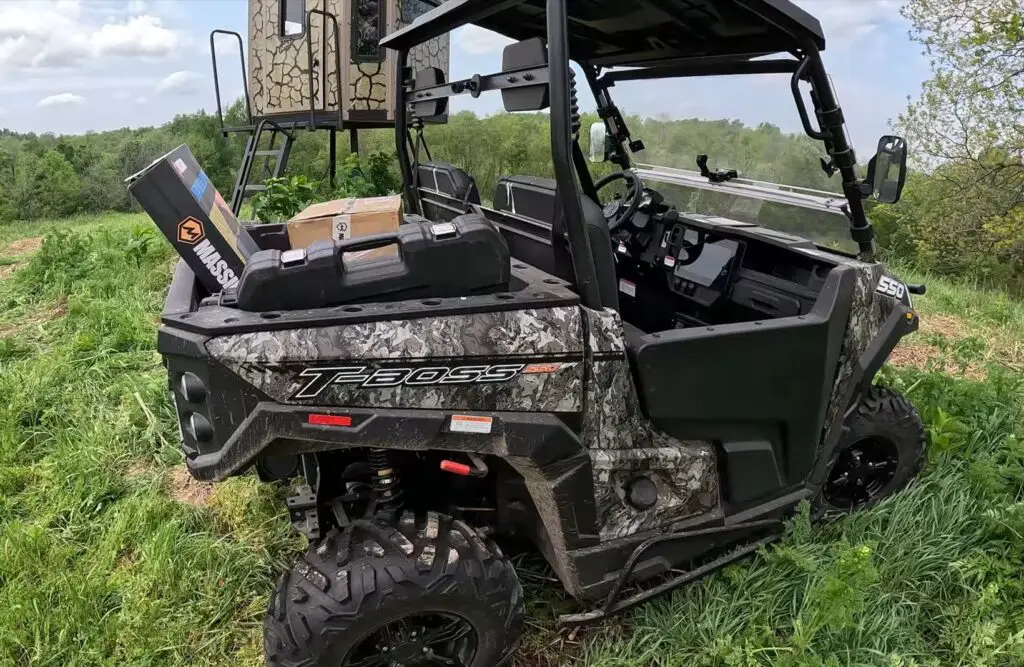
The Massimo T-Boss 550 Side-by-Side comes with a 546cc, 4-stroke engine with 35 horsepower, automated gearbox, four wheel drive, and a 1,500 pound towing ability. It costs around $9,000 and is suitable for heavy-duty outdoor work, off-roading, farming, and ranching.
- Massimo T‑Boss 550x UTV
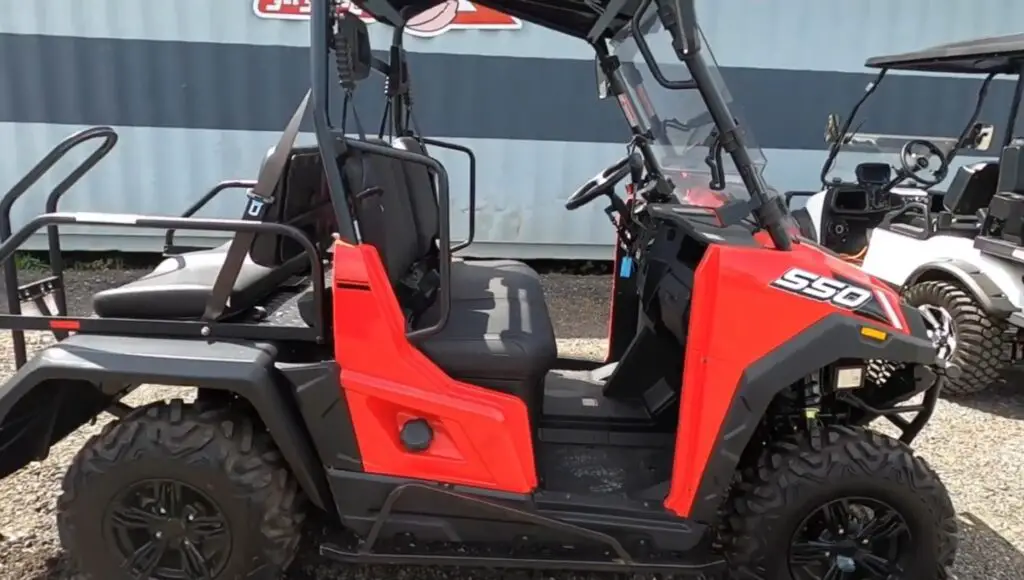
With a 546cc engine, 35 horsepower, 4wd, and a 1,500-pound towing functionality, the Massimo T-Boss 550X UTV shines. It costs around $10,000 and is ideal for off-roading, heavy-responsibility jobs, and outside interests like path riding, farming, and ranching.
- Massimo Motor Sports T‑Boss 760 UTV
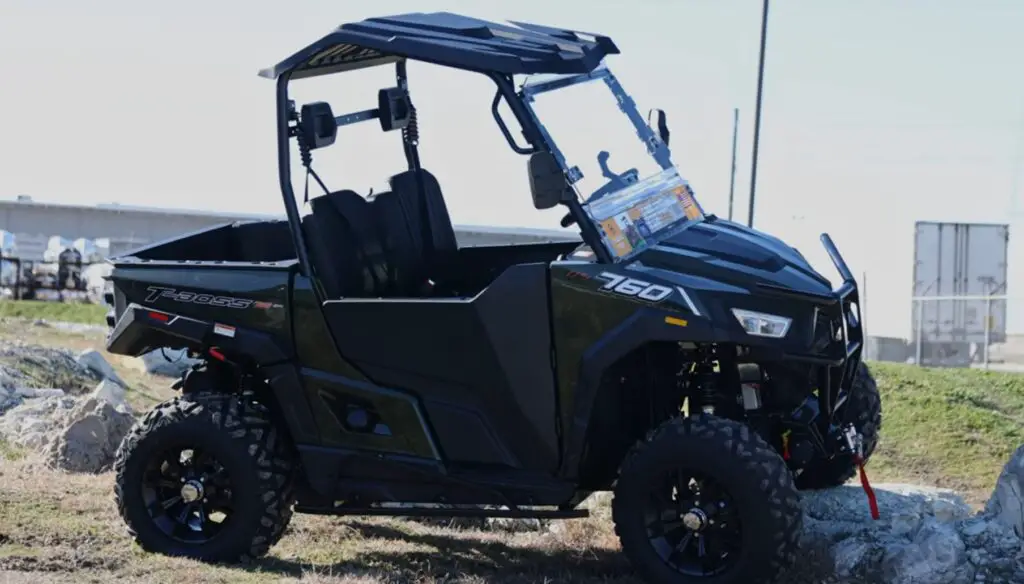
The Massimo T-Boss 760 UTV has a 760cc engine, a towing capacity of 1,500 pounds, 40 horsepower, and 4WD. It costs about $12,000, and it will be perfect for powerful and durable work outside the home, such as farming, ranching, off-road, and working in heavy industries.
- BMS Motorsports Stallion 600
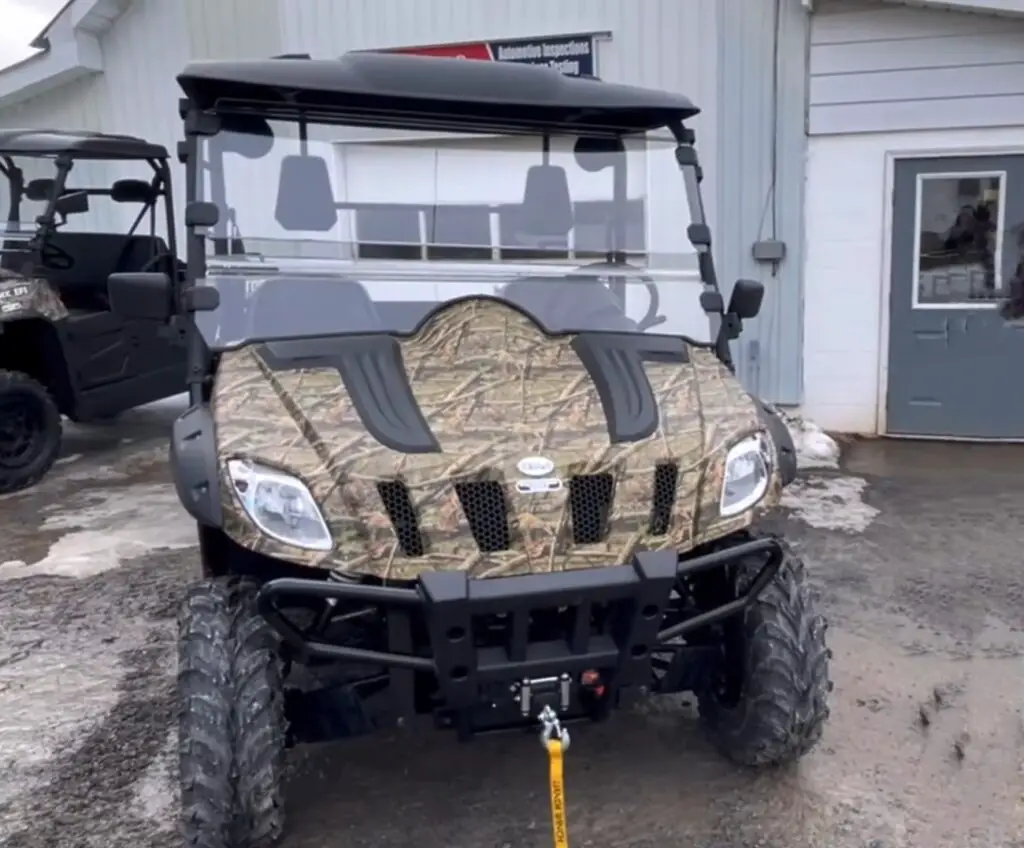
The BMS Stallion 600 is a powerful UTV with a 37-horsepower 594 cc EFI engine that costs $10,499.
- Massimo MSU 850 Side-by-Side
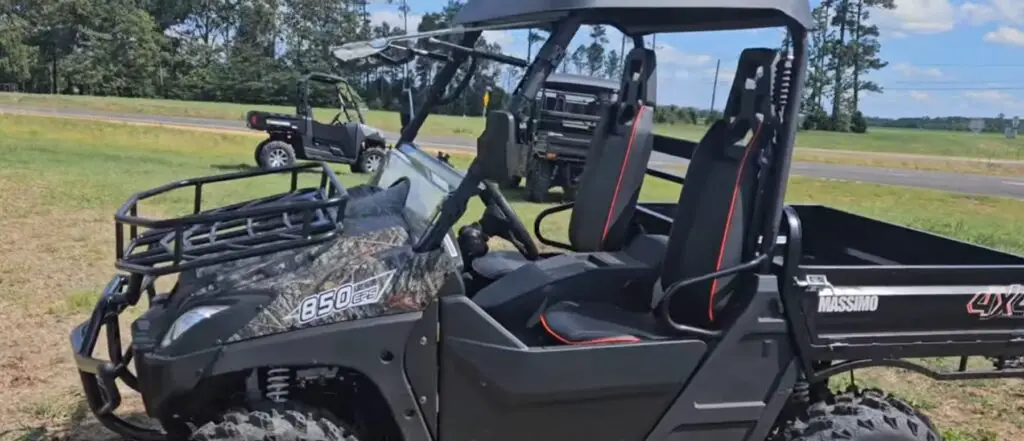
Massimo MSU 850 Side-by-Side has an 849cc engine, 4WD, 50 HP, and 1,500 lbs towing capacity. It is going for approximately $12000 and is recommended for use as an off-road wheeler, farming, construction, and other heavy-duty operations. It requires power and versatility.
The Massimo Buck 250 UTV is good for farming, small businesses, light hauling, and recreational trail riding. However, it is not ideal for heavy-duty construction work, extreme off-road terrains, or tasks requiring high towing capacity.
This entry-level UTV, including models like the 2021 Massimo Buck 250 and 2022 Massimo Buck 250, features a 6.5 cubic foot dumping cargo bed, Standard ABS Half Doors, a Tilting Full Windshield, and a Hard Top Roof.
Powered by a 12HP fuel-injected engine, it handles light-duty jobs effectively. While it excels in affordability and versatility, its 772lb dry weight and compact size limit its use in more demanding environments.
With a Standard Full Lighting Kit, it’s perfect for daytime and nighttime activities.
The Buck 250 delivers affordable fun on the trails! Want a bit more power? Learn more about the Massimo Buck 450 for your next ride!
Subscribe for Our Latest Posts! Thank you!
